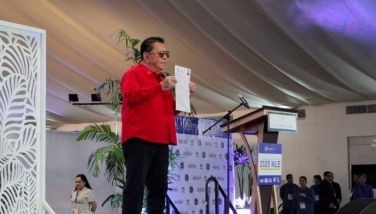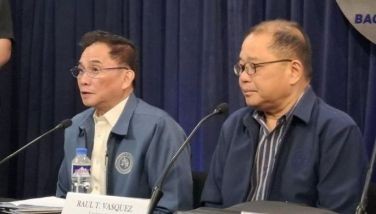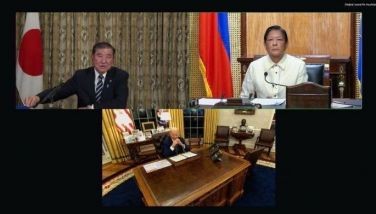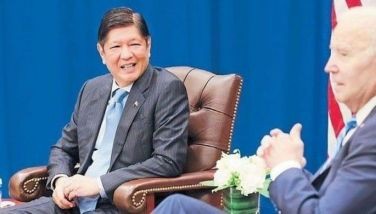SC upholds dismissal of case vs Pakistanis selling fake Viagra
August 22, 2006 | 12:00am
Two Pakistanis escaped prosecution for alleged illegal sale and distribution of Viagra, common pain relievers and other unregistered imported medicines after the Supreme Court (SC) upheld a Court of Appeals (CA) decision agreeing with the Department of Justice (DOJ) that they should not be prosecuted because the complainants failed to sustain the evidence against them.
In an eight-page decision, written by Associate Justice Cancio Garcia, the tribunal denied a petition of GlaxoSmithKline and other international pharmaceutical companies to compel the DOJ to prosecute Pakistanis Muhammad Ateeque and Khalid Mehmood Malik.
The SC ruled that DOJ prosecutors did not commit grave abuse of discretion in dismissing the complaint of GlaxoSmithKline against the two Pakistanis.
"Absent of any clear showing of arbitrariness, the court defers to the authority of the prosecuting arm to determine probable cause in preliminary investigation and shall give credence to its findings and determination," read the SC decision.
"Well settled is the rule that the court will not interfere in the conduct of preliminary investigations or reinvestigations and leave to the investigating prosecutor sufficient latitude of discretion in the determination of what constitutes sufficient evidence as will establish probable cause for the filing of the corresponding complaint or information against an offender."
The SC said prosecutors have the duty not to prosecute "when, after investigation or re-investigation, they are convinced that the evidence adduced was not sufficient to establish a prima facie case," read the decision.
"Hence, the question of whether or not to dismiss a complaint is within the purview of the functions of the prosecutor, and ultimately, the Secretary of Justice."
Court records showed that sometime in 2002, National Bureau of Investigation (NBI) agents swooped down on the business establishments owned by Ateeque and Khalid Mehmood Malik in Parañaque following a letter-complaint filed by Glaxo and two other drug companies, Roche and Pfizer.
Ateeque is the registered owner of the World Traders Inc. and Sahar International Trading Center, while Malik is the manager of the two companies based in BF Homes in Parañaque.
Ateeque showed NBI agents samples of the following medicines:
• Viagra, a drug for erectile dysfunction;
• Accupril for hypertension;
• Lipitor for hypertension;
• Dilantin for convulsion;
• Norvasc, manufacture by Pfizer for hypertension;
• Zinacef, an antibiotic;
• Betnovate cream and ventolin for asthma;
• Bactrim for infections;
• Bezalip for blood lipid and tilcotil for arthritis.
Later, the NBI found out that these are imported drugs bearing the brand names Glaxo, Pfizer and Roche, and that they were all without the requisite registration numbers from the Bureau of Food and Drugs.
Malik was arrested during an entrapment operation on June 9, 2002 after receiving marked money as payment for the imported pharmaceutical products.
During the examination, the NBI found out that the pharmaceutical products being sold by Malik are not in conformity with the standards of Glaxo.
Malik was charged with violation of Republic Act 3720, the Food, Drug and Cosmetic Act, and RA 8203, the law on counterfeit drugs before the Parañaque City regional trial court.
The Parañaque RTC recommended to the DOJ to conduct a preliminary investigation on Ateeque, who was at large at that time.
In a resolution on the consolidated preliminary investigations on Ateeque and Malik, Senior State Prosecutor Leah Tanodra-Armamento dismissed the complaints against them for failure of the complainants to sustain their evidence.
After the DOJ secretary approved Armamento’s resolution, the pharmaceutical companies led by Glaxo appealed to the CA.
On Oct. 28, 2004, the CA denied the appeal, prompting the pharmaceutical firms to elevate the case to the Supreme Court.
In Congress, Sen. Manuel Roxas sought yesterday amendments to the Intellectual Property Code to make medicines more affordable for the people.
Roxas, chairman of the Senate committees on economic affairs and on trade and commerce, said the approval of Committee Report No. 79 containing Senate Bill No. 02263 would enable Filipinos to buy their medicines at more affordable costs similar to those in Thailand, India, Japan and other countries.
"Filipinos should not be made to pay quality medicines at prices that are five times or more than those available in other countries," he said.
Roxas noticed the following differences in the prices of medicines here and other countries in the region:
• Norvasc, a prescription drug for hypertension, costs the equivalent of only P5 in India but it is priced at P44.75 in the country.
• Ventolin inhaler, for bronchial asthma, is sold at the peso equivalent of P231 in Thailand, but sells for P406 here.
• Bactrim 400, an antibiotic to treat a wide range of infections, costs P17.75 in the country but only sells for P1 in Pakistan and 69 centavos in India.
"We have a solemn duty to correct this injustice," he said.
Roxas blamed the structure of the pharmaceutical industry, behavioral orientation of consumers, doctors and public health institutions, and protectionist provisions of the law as major causes of the rising cost of medicines in the country. — Jose Rodel Clapano, Christina Mendez
In an eight-page decision, written by Associate Justice Cancio Garcia, the tribunal denied a petition of GlaxoSmithKline and other international pharmaceutical companies to compel the DOJ to prosecute Pakistanis Muhammad Ateeque and Khalid Mehmood Malik.
The SC ruled that DOJ prosecutors did not commit grave abuse of discretion in dismissing the complaint of GlaxoSmithKline against the two Pakistanis.
"Absent of any clear showing of arbitrariness, the court defers to the authority of the prosecuting arm to determine probable cause in preliminary investigation and shall give credence to its findings and determination," read the SC decision.
"Well settled is the rule that the court will not interfere in the conduct of preliminary investigations or reinvestigations and leave to the investigating prosecutor sufficient latitude of discretion in the determination of what constitutes sufficient evidence as will establish probable cause for the filing of the corresponding complaint or information against an offender."
The SC said prosecutors have the duty not to prosecute "when, after investigation or re-investigation, they are convinced that the evidence adduced was not sufficient to establish a prima facie case," read the decision.
"Hence, the question of whether or not to dismiss a complaint is within the purview of the functions of the prosecutor, and ultimately, the Secretary of Justice."
Court records showed that sometime in 2002, National Bureau of Investigation (NBI) agents swooped down on the business establishments owned by Ateeque and Khalid Mehmood Malik in Parañaque following a letter-complaint filed by Glaxo and two other drug companies, Roche and Pfizer.
Ateeque is the registered owner of the World Traders Inc. and Sahar International Trading Center, while Malik is the manager of the two companies based in BF Homes in Parañaque.
Ateeque showed NBI agents samples of the following medicines:
• Viagra, a drug for erectile dysfunction;
• Accupril for hypertension;
• Lipitor for hypertension;
• Dilantin for convulsion;
• Norvasc, manufacture by Pfizer for hypertension;
• Zinacef, an antibiotic;
• Betnovate cream and ventolin for asthma;
• Bactrim for infections;
• Bezalip for blood lipid and tilcotil for arthritis.
Later, the NBI found out that these are imported drugs bearing the brand names Glaxo, Pfizer and Roche, and that they were all without the requisite registration numbers from the Bureau of Food and Drugs.
Malik was arrested during an entrapment operation on June 9, 2002 after receiving marked money as payment for the imported pharmaceutical products.
During the examination, the NBI found out that the pharmaceutical products being sold by Malik are not in conformity with the standards of Glaxo.
Malik was charged with violation of Republic Act 3720, the Food, Drug and Cosmetic Act, and RA 8203, the law on counterfeit drugs before the Parañaque City regional trial court.
The Parañaque RTC recommended to the DOJ to conduct a preliminary investigation on Ateeque, who was at large at that time.
In a resolution on the consolidated preliminary investigations on Ateeque and Malik, Senior State Prosecutor Leah Tanodra-Armamento dismissed the complaints against them for failure of the complainants to sustain their evidence.
After the DOJ secretary approved Armamento’s resolution, the pharmaceutical companies led by Glaxo appealed to the CA.
On Oct. 28, 2004, the CA denied the appeal, prompting the pharmaceutical firms to elevate the case to the Supreme Court.
In Congress, Sen. Manuel Roxas sought yesterday amendments to the Intellectual Property Code to make medicines more affordable for the people.
Roxas, chairman of the Senate committees on economic affairs and on trade and commerce, said the approval of Committee Report No. 79 containing Senate Bill No. 02263 would enable Filipinos to buy their medicines at more affordable costs similar to those in Thailand, India, Japan and other countries.
"Filipinos should not be made to pay quality medicines at prices that are five times or more than those available in other countries," he said.
Roxas noticed the following differences in the prices of medicines here and other countries in the region:
• Norvasc, a prescription drug for hypertension, costs the equivalent of only P5 in India but it is priced at P44.75 in the country.
• Ventolin inhaler, for bronchial asthma, is sold at the peso equivalent of P231 in Thailand, but sells for P406 here.
• Bactrim 400, an antibiotic to treat a wide range of infections, costs P17.75 in the country but only sells for P1 in Pakistan and 69 centavos in India.
"We have a solemn duty to correct this injustice," he said.
Roxas blamed the structure of the pharmaceutical industry, behavioral orientation of consumers, doctors and public health institutions, and protectionist provisions of the law as major causes of the rising cost of medicines in the country. — Jose Rodel Clapano, Christina Mendez
BrandSpace Articles
<
>
- Latest
- Trending
Trending
Latest
Trending
Latest
Recommended

































